"Like a Paralysis"
News Based on facts, either observed and verified directly by the reporter, or reported and verified from knowledgeable sources.
Ukrainians in Westchester face a threat to their homeland and families

Good morning! Today is Monday, February 21, and you are reading today’s section of Examiner+, a digital newsmagazine serving Westchester, Putnam, and the surrounding Hudson Valley.
Need to subscribe — or upgrade your Examiner+ subscription to enjoy full access to all of our premium digital content? Details here.
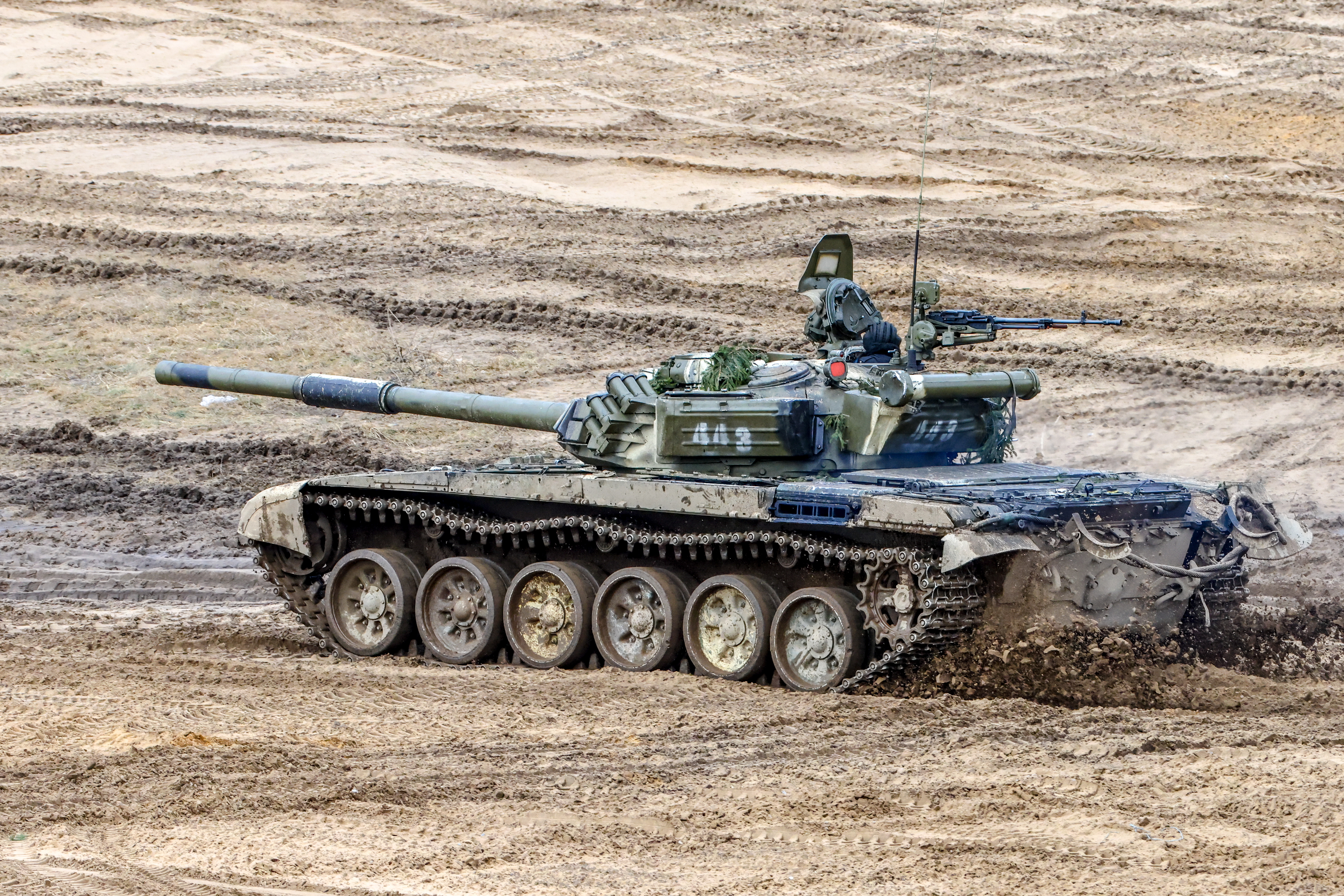
On February 11, Petro Rondiak received a call from the US State Department. It was time for him to leave Kyiv (Kiev), where he heads the management board for a car importer, and return to the US, the caller said.
Instead, Rondiak, who owns an apartment in Tuckahoe with his wife, has hunkered down. He stocked up on diesel fuel and survival gear, bought a satellite phone and water filtration system, and is now working on getting a gun permit. And unless the situation gets significantly worse, he does not plan on fleeing.
“This is my home. For me to leave, I would have to feel actual danger to my life, which I don’t feel right now,” says Rondiak, who grew up in the US before moving to Kyiv in 1995. “It would send a really weird message to say, ‘See you later. I’m American, so I’m out.’”
His wife, Ola, meanwhile, has split her time between Kyiv and the US, where the couple’s three children, all in their early 20s, all live. Ola is currently back in Tuckahoe but plans to return to Ukraine as soon as early March, depending on the situation.
“It’s like a paralysis,” Ola says of being stateside while her husband is back home. “When you’re together, at least you’re together, and you’re going through the day. But now, there is a worry that you can’t do much about.”
Since the start of the crisis between Russia and Ukraine late last year, most of the estimated 10,000 Ukrainians living in Westchester have been forced to watch events unfold from afar, physically safe but emotionally anguished. Many, especially immigrants and children of immigrants, still have close family members in the country and go back frequently. The past several weeks, those spoken to for this article explain, have been spent continuously messaging with family and obsessively following the news.
“It’s on TV all the time. But everybody is constantly on their phones to check Twitter, see what’s going on,” says Andrij Burchak, an executive at SUMA Federal Credit Union in Yonkers. “We are basically living off social media or texts from family.”
Concern over an all-out invasion of Ukraine by Russia has grown since the fall, as Russia has amassed more than 190,000 troops along the Ukrainian border. In late January, President Joe Biden said that an invasion is likely in February; both Biden and the State Department have since declared that an invasion would come any day.
Westchester has been home to a significant Ukrainian diaspora since the 1880s, the beginning of the “first wave” of Ukrainian migration to the US, which lasted until 1914. Western Yonkers remains home to many Ukrainian-Americans, and St. Michael the Archangel Ukrainian Catholic Church, the Ukrainian Youth Center, and SUMA FCU, which serves the Ukrainian community, are all within roughly a mile of each other.
By last week, the threat of an invasion was at the front of people’s minds within the Ukrainian community. At SUMA FCU, phrases including “We support Ukraine,” “Say No to Putin,” and “Russian Sanctions Now” are projected onto the building’s main facade. At a Ukrainian American Youth Association meeting on February 15, signs stating “We support Ukraine” were distributed, while teenage girls recorded videos for social media after the meeting to raise awareness of the crisis.
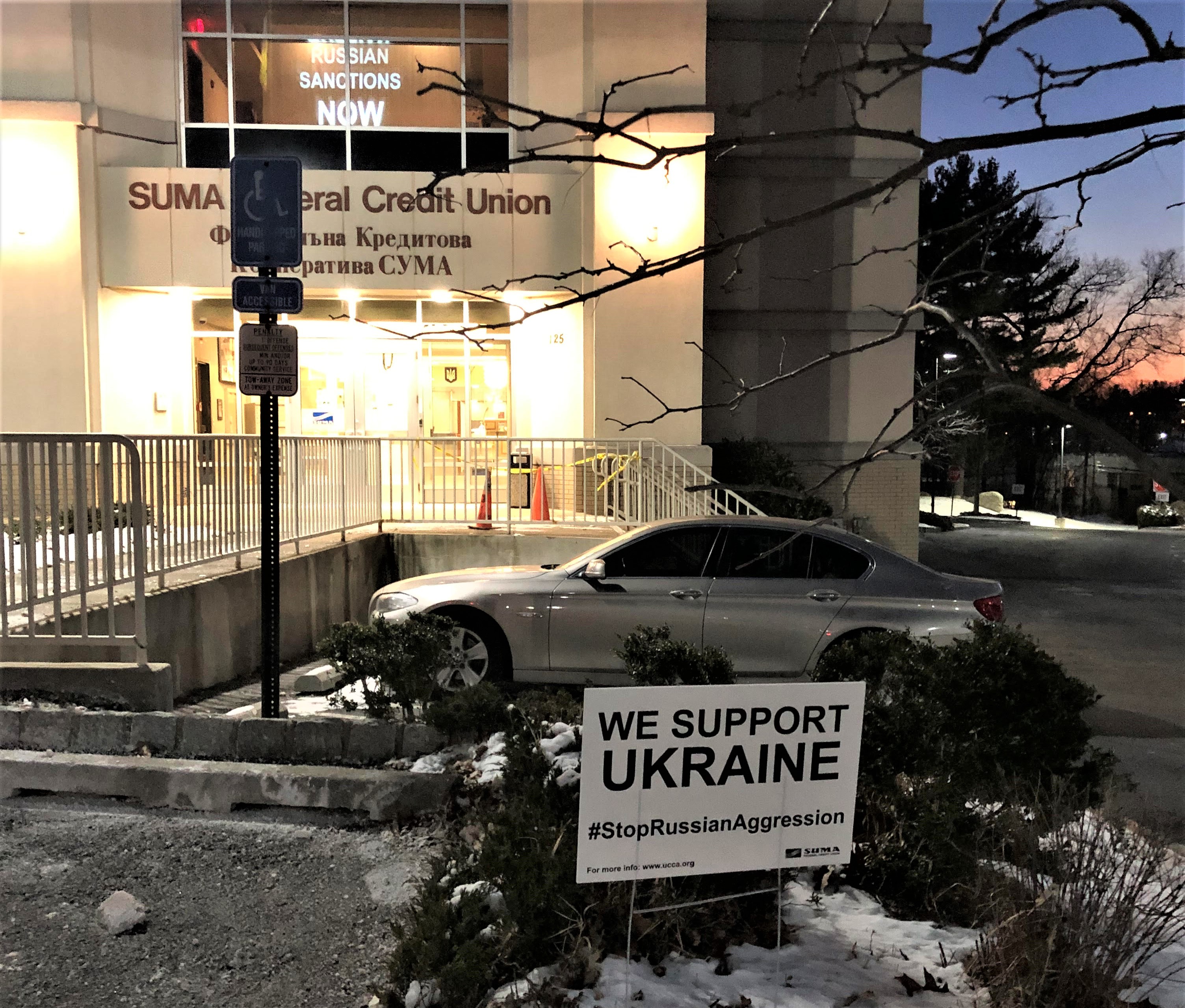
“It is mobilizing whatever political force we have here,” says Burchak.
The credit union has mobilized resources, both its own and the community’s, to support Ukraine. The organization supports Revived Soldiers Ukraine, which provides aid to the people in Ukraine and helps rehabilitate wounded Ukrainian soldiers.
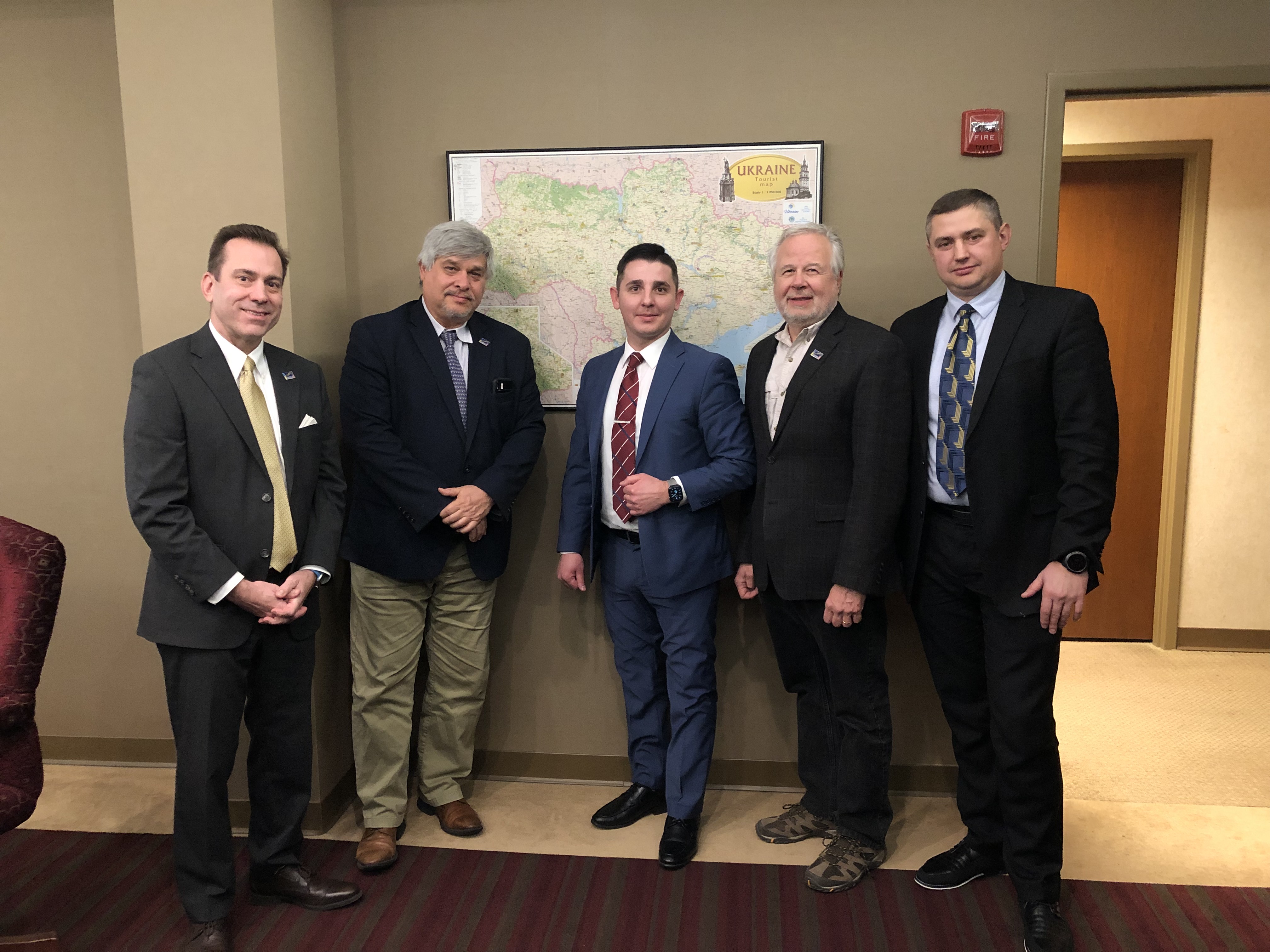
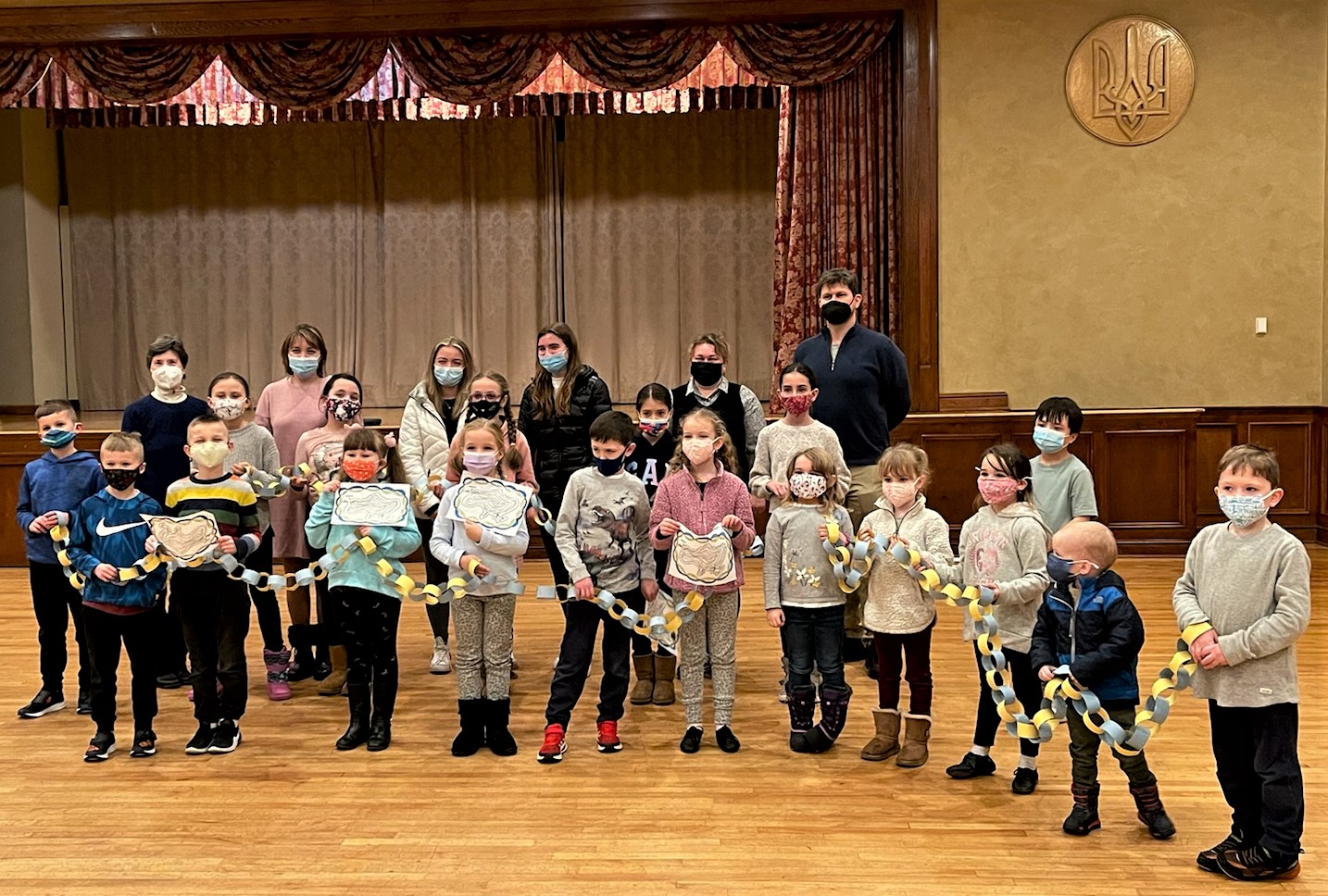
But from across the ocean, Westchester residents with families in Ukraine are limited in how much they can help.
“Everybody is scared. They are scared in a sense because they don’t know what is going to happen,” says Rev. Kiril Angelov, the pastor at St. Michael’s. “They have families there, close families. They have mothers, fathers, brothers, sisters. And to look from this side at what is happening, it is a human thing to be scared.”
Oleh Bilovus, who moved to Yonkers six years ago, still has family in both eastern and western Ukraine. He talks to them every day, discussing how to get them out of the country should the time come.
“It is very stressful,” he says. “You assume that they are not telling you the reality because they don’t want to stress you. If you know everything, you’re going to go crazy.”
“It affects every single business in Westchester where a Ukrainian works,” he adds, “because if you are stressed, and you are constantly thinking about your family in Ukraine and the war, you are not so productive,”
Liliya Balkova, president of the Ukrainian National Women’s League of America (UNWLA) Westchester branch, moved to Yonkers from Ukraine in 2005 and now lives in Yorktown. Both her husband’s family and her own are still in Ukraine.
“It’s really hard because you don’t know what could happen. There is a difference in the time, so any single call that comes in the middle of the night, means that something happened in Ukraine because it’s morning there,” says Balkova. “Going to bed, you’re always thinking what the next day will bring you.”
“It seems like everybody has got a plan B or even a plan C,” says Andrew Horbachevsky, a Yonkers-based consultant and a former chairman of the board of directors at SUMA FCU. “You don’t know if you’re going to wake up, and all hell breaks loose. It’s certainly stressful and disheartening.”
Halyna Cherneha, who moved to the US in 2007, says she chose to come to Yonkers because the city has a robust Ukrainian community that will allow her to pass her language and traditions on to her children. Both her and her husband’s family remain in Ukraine.
“It’s always hard to hear something that happens in Ukraine because all my childhood was there and all my family is there,” she says. “It is not easy to open the news and see that Russia wants to attack us.”
Many Ukrainians have sought comfort through both community and religion, with more people attending religious services in recent weeks, according to Reverend Angelov.
“I believe that the prayers will help,” he says. “The sincere prayer is powerful. No matter where, no matter how.”
For many Ukrainians, the history of Russian and Soviet rule over their country during periods of the past century looms large. Yuriy Fizer, a Yorktown resident who immigrated 18 years ago, grew up hearing stories about his grandparents’ life under Soviet occupation during and after World War II.
“They acted, my grandma always told me, like savages,” harassing women, drinking, and stealing from the population, Fizer says. “They came to the village, confiscated all the means of conducting business, all the food, under the premise of feeding the liberators’ army.”
“When I hear the stories about what is going on there, the history reverberates in me on a probably cellular or genetic level,” he continues. “I look at the Russians differently than other people would because I feel if they come back, they will do the same thing.”
Ola Rondiak recalls similar generational trauma. After World War II, her grandmother was sent to the Gulag when Ola’s mother was just 11 years old.
The current tensions mark the second time in less than a decade that Ukrainians in the county have looked with worry at events in their homeland. This Sunday, St. Michael’s will commemorate the eighth anniversary of 2014’s Maidan revolution, or Revolution of Dignity, in which massive protests led to the ousting of Ukraine’s Russia-aligned president, Viktor Yanukovych. The protests led to the invasion and occupation of Crimea and Donbas by Russia and Russian-backed separatist forces.
So far, the situation in Kyiv is nothing like it was during the 2014 fighting, according to Petro Rondiak.
“It was a lot scarier. There were runs on gas; there were runs on grocery scores. There were weird outages. And we had all three kids here trying to go to school each day,” he says. As of Thursday, “there are no outages. There are no empty shelves. Everything is functioning as normal.”
But the current conflict is “an existential threat to the country itself,” says Roman Kozicky, President and CEO of SUMA FCU.
“It was a revolution back then inside of the country,” says Balkova. “Now, we are talking about a war.”
If Ukraine is divided between pro-Western Ukrainians and those more sympathetic to Russian influence – a division those spoken to for this article see as overstated – it is not reflected in Westchester’s Ukrainian population or the diaspora in America at large, according to Kozicky. He estimates that “99.9 percent” are aligned against Russia’s aggression, and the remaining fraction of a percent are primarily disinterested.
“You will find that Ukrainian Americans are aligned with western standards of democracy and sovereignty,” he says. “They do not want to become part of this resurging Russian empire.”
As far as American and western policy goes, the Ukrainian community has been pushing for sanctions on Russia and its leadership. The sanctions should be put into place in advance of an invasion, with a waiver that is pulled the moment Russian President Vladimir Putin invades, says Kozicky.
“You need to go after their assets,” Kozicky says, referring to Russia’s leaders. “Stop letting their kids go to western schools. Stop letting them buy real estate in London. Put the squeeze on them so that you treat them like the pariah that [Putin] is creating.”
The community had a close relationship and strong support from Westchester’s congress members, Elliot Engel and Nita Lowey, Kozicky says. Lowey retired last year and was replaced by fellow Democrat Mondaire Jones, while Engel lost in a Democratic primary to current Congressman Jamaal Bowman. The two freshman congressmen have been less receptive, according to Kozicky.
“Their replacements, we have outreached to them, and they haven’t been forthcoming to us,” Kozicky says. “They seem to have different priorities. All of which might be good, but they don’t include Ukraine. They don’t represent us in that regard.”
While Rondiak is not leaving Kyiv for the time being, he is prepared to flee to western Ukraine and possibly into Poland if Kyiv comes under attack.
“I speak the language. The more west you get out of Kyiv, the more it becomes where I am from,” he says. “These are my people. If the road gets bombed, I am ready to walk.”
Rondiak has been vocal on social media in his opposition to Russia since 2014 and does not want to take any chances should Russia invade.
“I have no intention of hanging out and having the discussion with the Russian police and the Russian administration,” he says. “That, I think, would be naive.”
On Thursday, Ola Rondiak attended a rally at the United Nations in Manhattan (below), with hundreds of people waving flags and carrying posters. As she did, President Biden warned that Russia seems to be “moving towards an imminent invasion.”
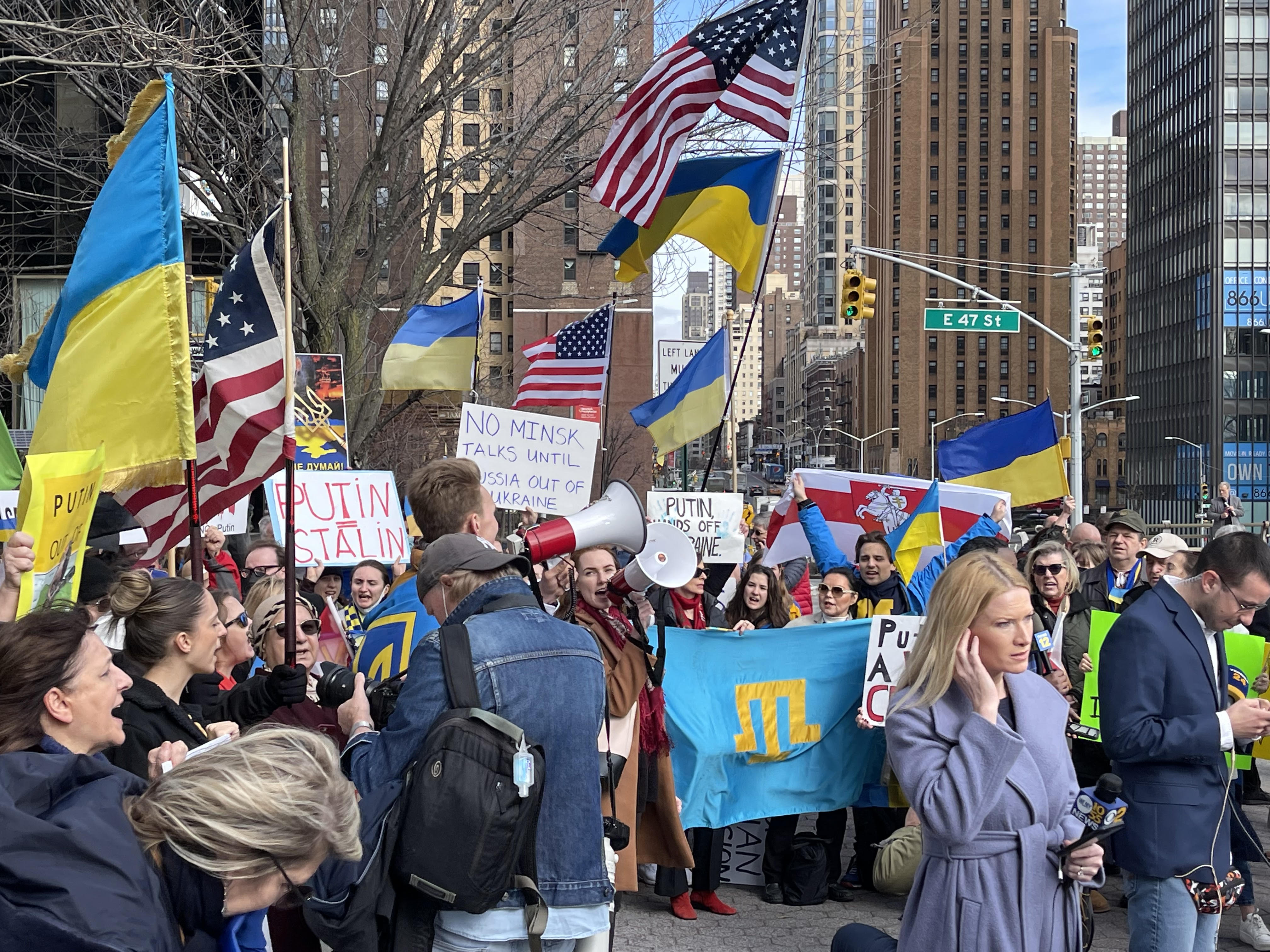
Ola says she is still battling when and whether to return to their home in Kyiv.
“The day-to-day, maybe, would be better, just because he’s there and going to work. Our dogs are there, and our house is there,” she says. “But when I think about it from the kids’ perspective, I don’t know if it’s good for them to feel that we are both there. They want us together, and they would get it, but it might produce more anxiety for them knowing we would both be in danger.”
Andrew Vitelli is the former editor of The Putnam Examiner and The White Plains Examiner. A Hastings-on-Hudson native, he now lives in White Plains with his wife, Zeynep, two-year-old daughter, Zoe, and their dog Beasley.
We hope you’ve enjoyed today’s section of Examiner+. What did you think? We love honest feedback. Tell us: examinerplus@theexaminernews.com

Examiner Media – Keeping you informed with professionally-reported local news, features, and sports coverage.

